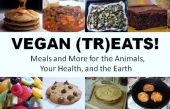

David Sztybel PhD
One of the world's oldest religions, Jainism is also distinguished as one of the faiths that cares the most about nonhuman animals. It is a religion without God that yet holds that our souls can become gods through liberation. It is said that our souls accumulate karman particles through both good and bad actions, which make good or bad things, respectively, happen to us in turn. The goal is to cease all passions and actions that generate good and bad karma, as these particles literally make us too heavy to leave the realm of rebirth. The soul that has escaped the cycle of rebirth ascends to a permanent resting place at the very apex of the universe. The key to achieving divine liberation is by practising ahimsa, or avoiding injury to all life. The positive side of this is a reverence for all life or a universal love for all creatures.
If one acts badly in a lifetime, one could be reborn as a primitive being. There are simple one-sense beings with only a sense of touch (e.g., plants and microscopic nagodas, which come in the form of earth bodies, water bodies, fire bodies, and wind bodies), two-sense beings who also have taste (e.g., worms, leeches), three-sense beings who can also see (e.g., ants, moths), four-sense beings who smell things as well (e.g., bees, flies, mosquitoes), and five-sense beings who hear in addition to the other senses (e.g., fish, dolphins, elephants, or any being born in a womb). There are rational and nonrational five-sense beings.
Inflicitng injury on these creatures is wrong because of the suffering caused, and also because it produces passions in the killer leading to karma and rebirth. The Jains condemn all animal sacrifices, build animal shelters, and never hunt or fish. Farming, which injures insects, is permitted because the harm is unintentional, but Jain monks beg with a bowl so crumbs will not attract insects that would be crushed underfoot. Monks brush their path to sweep away small life forms they might otherwise step on. It is prohibited to breed destructive animals and considered noble to allow oneself to be bitten by a snake rather than kill it. Jains are vegetarians but consume milk.
Dundas, Paul, The Jains (New York: Routledge, 1992).
Gopalan, S., Outlines of Jainism (New York: Halsted Press, 1973).
Jain, Jyotiprasad, Religion and Culture of the Jains (New Delhi: Bharatiya Jnanpith, 1975).
Jaini, Padmanabh S., The Jaina Path of Purification (Berkeley: University of California Press, 1979).
Mardia, K. V., The Scientific Foundations of Jainism (Delhi: Motilal Banarsidass, 1990).

